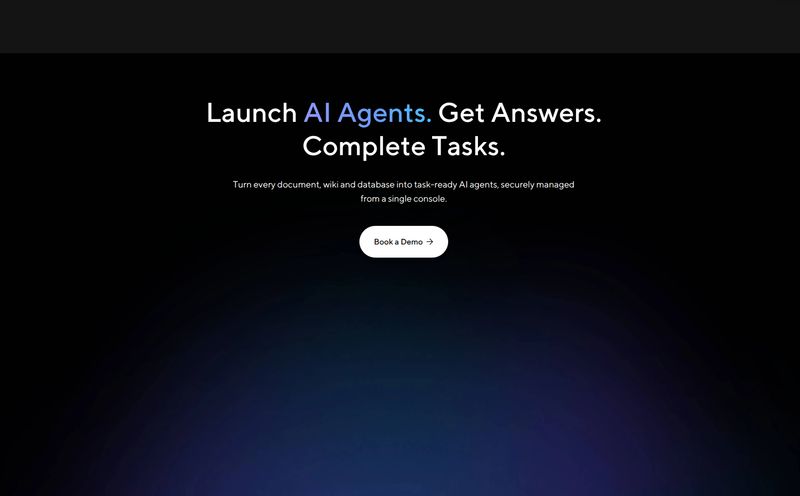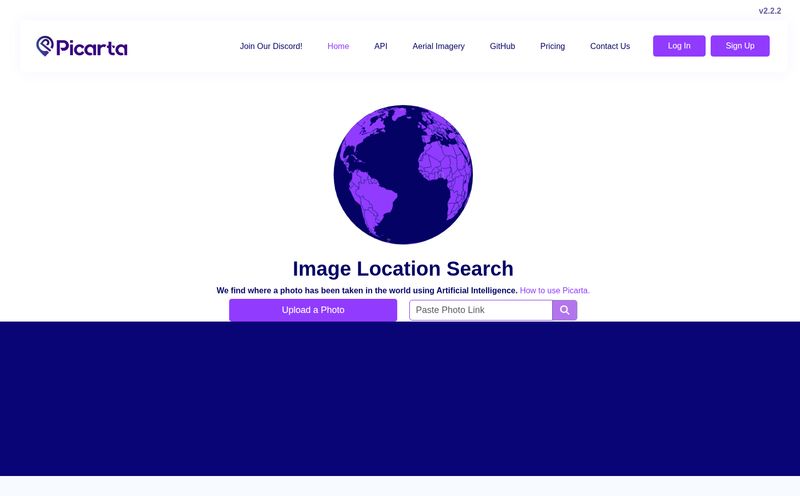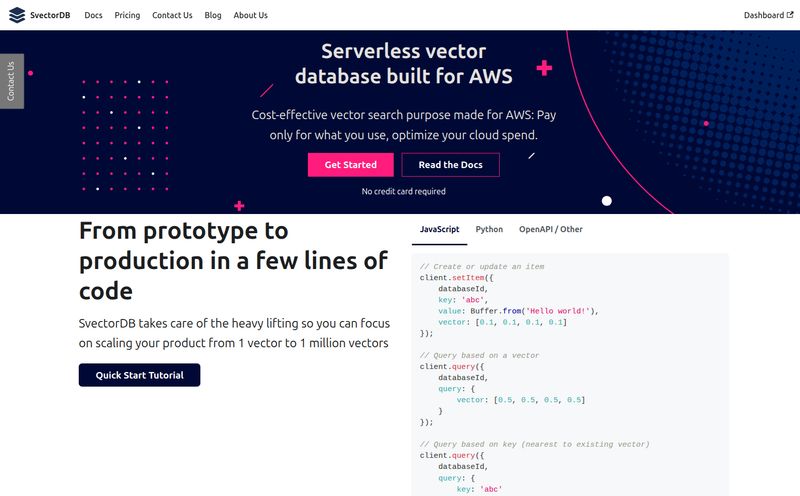There's a special kind of dread that sets in after you finish a truly fantastic book. You know the feeling. The story is over, the characters are gone, and you're left with a book-shaped hole in your life. What on earth do you read next? You scroll through Goodreads, browse Amazon's increasingly bizarre suggestions, and maybe even text a friend. It's a real struggle. In the SEO world, we call this a "high-intent search," but in the real world, it's just plain annoying.
So when I stumbled upon PagePundit, my interest was immediately piqued. The promise was clean, simple, and exactly what I wanted to hear: AI Book Recommendations. The landing page, with its minimalist charm, whispered sweet nothings to the beleaguered reader in me. "Let Artifical Intelligence take the hassle out of finding your next great read," it said. A noble goal. (And yes, my inner editor spotted the 'Artifical' spelling, but hey, we've all pushed code with a typo before. No judgment here.)
First Impressions of PagePundit
The concept is brilliant, isn't it? It’s not just another algorithm. It’s supposed to be an AI, a digital librarian who has read everything and knows you better than you know yourself. A sommelier for stories. I imagined it asking me about my favorite themes, the prose styles I adore, and the character arcs that stick with me for years. I was ready for it to solve my literary analysis paralysis for good.
The whole setup felt like one of those sleek, single-purpose tools that are popping up everywhere in the AI space. No complicated sign-up, no endless menus. Just a clear value proposition and a big, friendly "Get Started Now!" button. It was inviting. It felt like the future.

Visit PagePundit
The Big Click and the Digital Ghost Town
So I clicked. I leaned in, ready for a list of life-changing novels to appear. And what did I get?
A 404 error. "File not found."
My journey into the future of book discovery ended abruptly at a GitHub Pages error screen. It was the digital equivalent of walking into a beautiful, newly-built library only to find all the shelves are completely empty. A bit of a letdown, to be honest. It's a story I've seen a hundred times in my years tracking trends and new tech: a great idea, a slick landing page, and… nothing behind the curtain. An AI ghost town.
So, What's the Real Story Here?
So, is PagePundit a scam? I dont think so. It feels more like a passion project that was either abandoned or is currently broken. A lot of these AI tools are built by small teams or even single developers on platforms like GitHub Pages. A broken link, a moved file, a lapsed project—it happens. It's the circle of life for new software.
This experience perfectly highlights one of the tool's listed cons: "Limited information provided in the context." You can't get more limited than a 404 page. There's no blog, no 'About Us', no contact info. Just a promise and a broken link. This is a risk with any new, unproven tool. You get excited about the potential, but the execution isn't always there.
The Untapped Potential of an AI Book Curator
Despite the dead end, the idea of PagePundit has been living rent-free in my head ever since. Why? Because the way we discover books right now is fundamentally flawed. Amazon's recommendations are built to sell, not to satisfy. They push bestsellers or books that are algorithmically similar in a very superficial way. "People who bought Stephen King's The Stand also bought his other 50 books." Thanks, super helpful.
A true AI book curator could be revolutionary. Imagine feeding an AI these prompts:
- "I want a sci-fi novel with the philosophical depth of Ted Chiang's work but the fast-paced, gritty world-building of 'The Expanse'."
- "Find me a historical fiction book set in a time period I've never read about, with a strong female protagonist and a touch of magic."
- "I'm in a reading slump. Give me something short, funny, and utterly heartwarming."
That’s a level of nuance that basic algorithms just can't handle. It requires understanding of theme, tone, prose, and pacing. That's the dream PagePundit was selling, and it’s a dream I’m still holding out for.
What Would a Perfect AI Book Tool Look Like?
If the PagePundit developers are reading this (hey, you never know!), or if someone else is building a similar tool, here's my two cents. A great AI book recommendation engine needs more than a single button. It needs a conversation. It should integrate with platforms we already use, like Goodreads or The StoryGraph, to understand our reading history. It should let us specify what we loved and what we hated about a book, not just give it a star rating.
"A good book is a good book, but the right book at the right time? That's magic. And that's what AI should be aiming for."
The Pricing Mystery
As you might've guessed, with a broken site, there was no pricing page to be found. Was PagePundit meant to be free? A freemium service? A paid subscription? We may never know. My guess is it was probably a free demo to test the waters. In this crowded market of AI tools, starting free to build a user base is the most common traffic generation strategy. But for now, its price is as much a mystery as its book recommendations.
A Story Half-Written
In the end, my experience with PagePundit feels like a short story with a missing final page. It’s a fantastic premise and a cautionary tale about the fast-paced, often messy world of AI development. It represents a genuine need—a smarter, more intuitive way to connect readers with stories.
I’m not giving up hope. Somewhere out there, someone is building the tool that PagePundit promised to be. Or maybe the original developers will fix that broken link and blow us all away. Until then, the search continues. And hey, if you've found an AI book recommendation tool that actually works, please, for the love of all that is literary, drop it in the comments below. My to-be-read pile is waiting.
Frequently Asked Questions about PagePundit
- What is PagePundit?
- PagePundit presents itself as an AI-powered service designed to provide personalized book recommendations and simplify the process of finding a new book to read.
- How is PagePundit supposed to work?
- Based on its landing page, the tool uses artificial intelligence to generate book suggestions. The user would presumably interact with the system, which would then provide a curated list of books tailored to their tastes.
- Why can't I access PagePundit?
- Currently, the "Get Started Now!" button on the PagePundit website leads to a 404 "File not found" error. This suggests the tool is either offline, the project has been abandoned, or there's a technical issue with the website's configuration.
- Is PagePundit free?
- There is no information available regarding the pricing of PagePundit. The lack of a pricing page and the simple nature of the landing page suggest it may have been intended as a free tool or demo, but this is unconfirmed.
- Are there good alternatives to PagePundit?
- Yes! While a true AI conversational curator is still emerging, platforms like The StoryGraph offer excellent recommendations based on mood and pace, going deeper than traditional sites. Goodreads also has recommendation features based on your shelves, and newer AI projects are always popping up.
Reference and Sources
- Goodreads: https://www.goodreads.com/
- The StoryGraph: https://app.thestorygraph.com/
- Harvard Business Review article on recommendation engines: https://hbr.org/2023/03/how-generative-ai-is-changing-recommendation-engines



